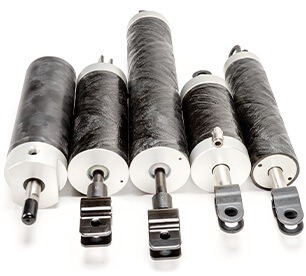CYLINDER TUBING
PNEUMATIC & HYDRAULIC CYLINDER SOLUTIONS
WHY POLYGON COMPOSITE CYLINDER TUBING?
The PolySlide® and PolySight® products are supplied as cylinder tubes ready for assembly, or as a complete cylinder designed for your application. Our pneumatic and hydraulic cylinder tubing is available in standard sizes or can be designed to your requirements.
KEY BENEFITS
Low friction for reduced seal wear, so you won’t have to worry about replacements
Combats denting with impingement resistance, so they’ll last longer and save you money

Non-conductive, meaning they are the safer option
PolySlide – PolySlide can be interchanged with any metallic cylinder material in a variety of tie-rod applications.
SAFER PRODUCTS
FROM THE INSIDE OUT
COMPOSITE PNEUMATIC & HYDRAULIC CYLINDERS & TUBING
The PolySlide® and PolySight® products are supplied as a cylinder tube ready for assembly, or as a complete cylinder designed for your application. The cylinder tubing is available in standard sizes or can be designed to your requirements.
PolySlide® Features
The bore surface of the PolySlide® cylinder improves seal wear by reducing friction. There are two types of friction that oppose each other in the bore surface: adhesion and interlocking friction. Adhesion Friction is the physical attraction of two smooth surfaces brought into close contact with each other. As the contact area increases, so does the adhesion between the surfaces. A smooth surface reduces the gap between the surfaces resulting in higher adhesion. Adhesion acts as a frictional force when the one object slides against the other. The friction between O-ring seals and bore surfaces increases significantly as the surface finish of the bore is reduced from 16 Ra to 6 Ra. A higher Ra bore surface finish will reduce the seal adhesion friction and extend seal life. Interlocking Friction is the result of shear forces encountered from irregularities between contacting surfaces during sliding motion. Machined surfaces created by boring or honing produce microscopic rough edges that penetrate and shear the softer seal material and reduce seal life.
METAL CYLINDER FRICTION
For metallic cylinders, a lower Ra bore finish (smoother surface) is desirable to reduce the interlocking friction resulting in extended seal life.
Optimum Ra finishes require a compromise between these two frictional conditions. The PolySlide bore surface is formed by a molding process, creating a surface that is microscopically round in nature. A wear resistant material incorporated into the bore surface increases lifespan. Together, these features allow the seal to slide over the bore surface contour, minimizing interlocking friction.
Since interlocking friction is not a significant issue with PolySlide, this reduces the importance of the Ra finish. PolySlide cylinder contact surfaces are undulating; rounded and cylindrical in nature.
In addition to the topographic advantages of the PolySlide bore surface, lubricants are incorporated within the bore surface material. This lowers the surface tension at the bore surface with respect to the seal material. Wear resistant additives incorporated within the bore surface material result in a very hard wear surface with a Rockwell hardness of 50C to 60C. All these features provide a seal-friendly bore surface.
High Strength / Non-Metallic Cylinder Material
The strength of the PolySlide® cylinder comes from continuous fiberglass filament reinforcement within an epoxy matrix that is wound into a composite cylinder. The cylinder exhibits orthotropic material properties as compared to isotropic properties for metals. An orthotropic material means the physical properties vary with the geometric coordinates of the cylinder, and the ability to vary the orthotropic properties of a filament wound structure within a specific geometry gives versatility to a composite cylinder, which cannot be accomplished with isotropic metallic cylinders. Consult a Polygon Sales Engineer for information relating to specific applications.
Corrosion Resistance
PolySlide cylinders do not rust, and galvanic corrosion is not a problem. They are resistant to many chemicals that corrode metal cylinders. PolySlide® is not limited to non-corrosive lubricants or hydraulic fluids. For example, water could be used to replace hydraulic fluid because PolySlide® resists corrosion. Chemical exposure recommendations are based on long term physical containment testing. PolySlide® cylinders may withstand short-term exposures to non-recommended chemicals. Contact Polygon’s Sales Engineers with any questions concerning chemical exposure ratings.
Dielectrically Insulative
PolySlide cylinder material is electrically insulative, and ideal for external limit switch positioning controls or other types of electronic positioning devices.
Static Discharge
PolySlide cylinders can be specially designed to meet most static discharge requirements due to composite material versatility.
Low Thermal Conductivity
The low thermal conductivity of PolySlide® cylinders make them “warm to the touch” as compared to metals. This allows PolySlide® to perform consistently across wide temperature ranges.
Impact Resistant
The composite structure of PolySlide resists impact damage from debris and permanent cylinder wall deformation. This is ideal for applications where moderate velocity debris can cause impingement problems, such as railroad brakes or dump cylinders.
Lightweight
PolySlide cylinders are approximately four times lighter than steel, weigh less than aluminum and about the same as magnesium cylinders.
Smooth Cylinder Walls
PolySlide has very smooth cylinder walls to prevent material build-up and piston leakage. This also improves stick/slip conditions commonly experienced by metal cylinders sitting in a static condition for an extended time. Typical bore surfaces measure 6-20 µ-inch.
“The ‘tinkering mentality’ at Polygon has created many innovative, high quality products. The number of cylinders, along with many other products that Polygon has been able to create with fiberglass and resin, is impressive.”
